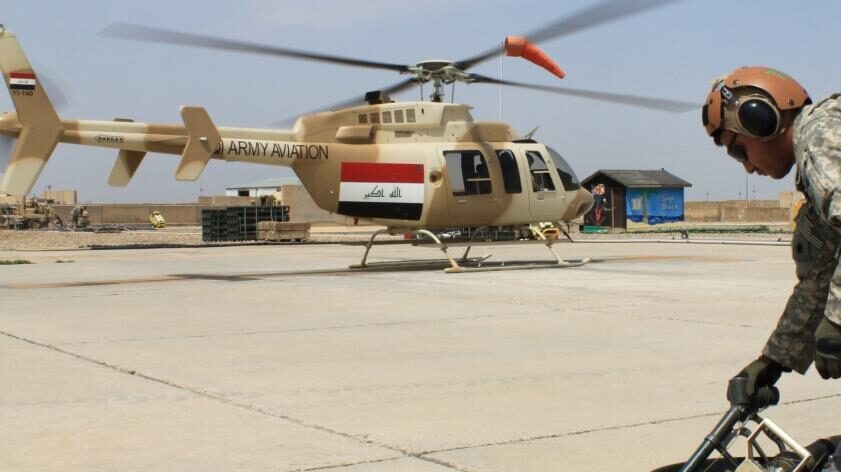
BEIRUT — Iraq is beefing up its rotorcraft fleet with a new planned purchase of French helos, a move experts said could take on new significance amid discussion of American troops’ eventual exit from the Middle Eastern nation.
Iraqi Major General pilot Tahseen Al-Khafaji, the spokesperson for the Joint Operations Command of various Iraqi forces, said in a televised interview that Baghdad signed a contract to procure French Caracal H225M helicopters, without specifying the number of aircraft and the worth of the deal.
He also noted previously disclosed plans to buy 21 US-built helicopters: nine Bell 407s and 12 Bell 412s, which Al-Khafaji said was on track. The general’s comments came after Iraq took delivery of seven Bell 505 trainers, expecting the other eight to follow.
“Our ambition is to have an air force fleet that covers all Iraqi operation zones,” Al-Khafaji said, adding that the armed forces priorities at this stage are the army aviation command, air force, air defense as well as land forces.
RELATED: If not fighter jets, what are Iraq’s defense procurement priorities?
Such deals are generally years in the making, but experts told Breaking Defense they’re especially noteworthy now as there is talk that US forces — with its airborne assets — will, at some point, leave the country.

The questions that warfighters ask the most are now answered with data analytics
CDAO’s Advana data analytics platform is ingesting data from about 500 DoD business systems.
The 407 capability, in particular, “may fill in the gaps that may appear after the US troops leave the country, [specifically] internal security, transport capability, long-range transport, light attack helicopters to escort and provide security, and ISR capabilities,” former Lebanese air force chief Brig. General Ziad Haykal told Breaking Defense.
In January Iraqi Prime Minister Mohammed Shia al-Sudani made vocal calls for the US to leave his country in a “quick” exit after the US killed a purported militant leader in Baghdad. At the time, analysts told Breaking Defense, there was little chance Iraq would actually follow through with pushing the US out, considering how much the US supports Iraq’s own forces.
But earlier this week Iranian news agency Tasnim reported that Iraq’s foreign minister will visit Washington next month “to make a formal announcement about the withdrawal of American military force.” White House National Security Communications advisor John Kirby did not confirm the visit or timing of the withdrawal plans.
“We have been engaged appropriately with bilateral talks with Iraq on what the future of the counter-ISIS mission is going to look like there in Iraq, how successful we’ve been with the Iraqi Security Forces, and what’s on the table for continued success in this vital mission,” Kirby said earlier this week in a press briefing.
Senior Middle East and North Africa analyst at the RANE Network, Ryan Bohl, told Breaking Defense that it’s unlikely any US withdrawal is “imminent,” but “the idea that U.S. troops may further draw down certainly adds urgency to the interest [in helicopters], especially as these helicopters are key parts of a comprehensive anti-terrorism fight.”
“Should Iraq procure new transport/tactical and attack helicopters, it would give Iraqi units greater mobility and strike capabilities against non-state actors like ISIS,” Bohl told Breaking Defense.
He added that these helicopters would improve the “Iraqi military’s flexibility in combating the resurgence of the group absent the United States, though it wouldn’t replace U.S. forces, particularly in terms of training and experience.”
Bohl also highlighted that relying on US and French military platforms will reduce Iraqi air force’s “reliance on older Russian/Soviet equipment and diversifies Iraq’s equipment away from the U.S. towards a friendly NATO power like France.” (A 2023 US Department of Defense Inspector General report noted that Iraq was purchasing other Bell helicopters in part “due to [an] inability to acquire spare parts” for its Soviet-era airframes “due to the war in Ukraine.”)
Haykal said the new 407s also are expected to replace aging 407s already in Iraq’s fleet, while the Caracal H225 M will add long-range transport capability.
Airbus didn’t respond to a request for additional comment on H225M deal with Iraq by publication time.